
Kevin Sowti, MD, MBA, Medical Director of Hospital Medicine and Chief of Internal Medicine at Chester County Hospital.
The Iran-Iraq War -- which took place from 1980-1988 -- remains fresh in the mind of Kevin Sowti, MD, MBA. In the aftermath, he and his family fled the only home he had ever known, an experience that continued to influence his life almost 40 years later.
Dr. Sowti, the former chief of staff at Chester County Hospital and current medical director of Hospital Medicine and chief of Internal Medicine at CCH, went into medicine to help people. That desire also compelled him to travel far beyond the hospital’s walls, too. Through the years, he's assisted in humanitarian aid efforts on nearly every continent.
When Russian soldiers invaded Ukraine on February 24, the news immediately snared his attention. The stream of images of refugees — many of them mothers and young children hauling whatever they could fit into overstuffed backpacks and suitcases — rekindled memories of his own family finding their way across Europe. Dr. Sowti knew he had to help. The only question was: how?
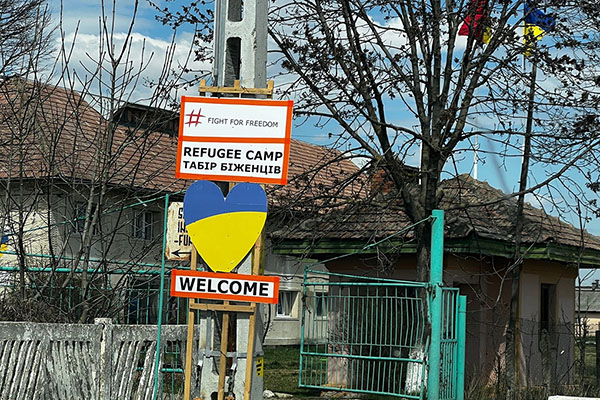
Where There's A Will...
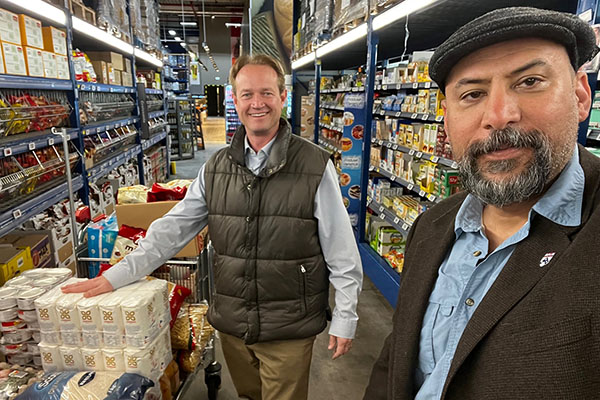
Shawn Kohl, an American attorney and friend of Dr. Sowti's who hosted him in Romania. Kohl works with IJM, specifically in Africa to stop human trafficking and slavery. He traveled to Europe to be involved with the current situation in Romania and Ukraine.
One of his first moves was to contact Shawn Kohl, a friend from Dr. Sowti's undergraduate years at the University of Dallas. Today, Kohl is the director for Central and Eastern Europe for a non-governmental organization (NGO) called International Justice Mission (IJM).
"He had many contacts at the Ukrainian border, and he relayed their medical needs, which were mostly over-the-counter medications and antibiotics," says Dr. Sowti, who was asking with the intent of delivering the supplies himself. However, at that point, he was unsure how he would get there.
Meanwhile, George Trajtenberg, MD, the retired Chief of Surgery at Chester County Hospital, introduced Dr. Sowti to his niece, who had been volunteering in Ukraine for years. She shared a list of medications that were needed where she was. From there, Dr. Sowti consulted Michael Duncan, president and CEO of CCH; Chief Operating Officer Michael Barber; and Heather Teufel, director of the hospital's pharmacy. Together they agreed to donate all the medications on the list Sowti had compiled.
It was early April by this point, and Dr. Sowti had also figured out how to deliver the medications with the help of his wife, Roschanak Mossabeb, MD, a neonatologist at Temple Health. Dr. Mossabeb, who had not seen her parents in person in nearly three years due to the pandemic, had planned an eight-day trip for their family to visit them at their home in Vienna, Austria. From there, Dr. Sowti planned to head for Bucharest, Romania, where he would meet up with Kohl and drive to the Ukraine border.
"It's only right that I thank my wife here for putting up with me," Dr. Sowti says. "No matter the cause, I know I always have her support."
And so, the family set off for Austria, with Dr. Sowti towing two suitcases full of donated medications
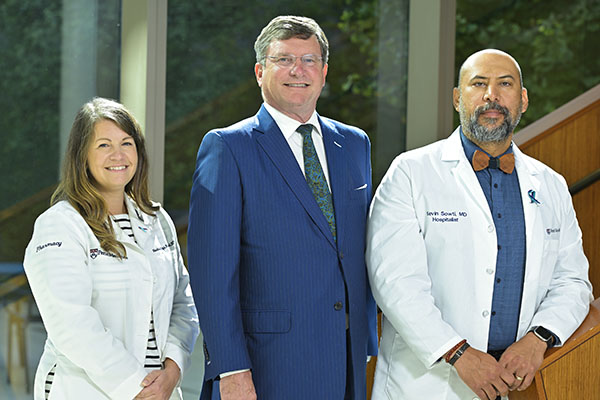 .
.
PICTURED LEFT TO RIGHT: Heather Teufel, Pharm.D, BCCCP, Director of Pharmacy; Michael Duncan, President and CEO; Dr. Sowti
Compassion All Around
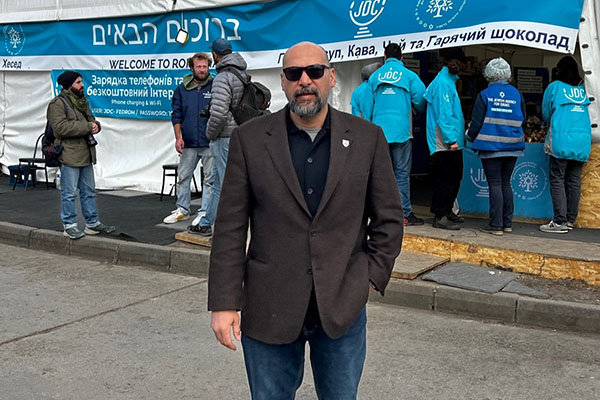
Sowti in front of an Israelie tent stationed at the border of Romania and Ukraine.
In Bucharest, Dr. Sowti and Kohl bought groceries and loaded them into a car supplied by IJM. Then Sowti and an IJM representative made the five-and-a-half-hour drive to a spot along the Romania-Ukraine border, just west of Moldova.
Upon their arrival, they left the food with a group of local volunteers who were preparing and distributing meals to Ukrainian refugees situated around the village. They then delivered the medications to two separate shelters housing refugees — one a former homeless shelter operated by IJM.
There, Dr. Sowti tended to a few ambulatory patients.
"There were three levels of interpretation to translate everything that was said," he explains.
The second shelter was run by the NGO with which Trajtenberg's niece was working.
"Despite the chaos of war, it was all very well-organized," Dr. Sowti says of the aid operations. "The area didn't exactly have a wealth of resources, but everyone was pitching in, trying to help. People were cooking and consoling. I've never seen anything like it. At the same time, the worst of what people can do was happening just miles from us."
In many instances, he says, the shelters housed the refugees until transportation could be arranged to take them farther abroad. Dr. Sowti says there was no immediate threat where they were, and he never felt in danger.
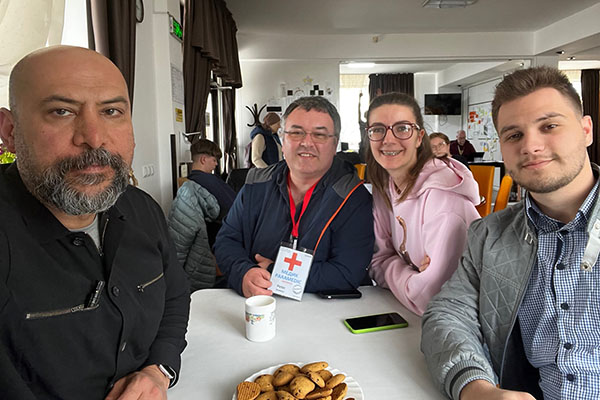
"The Bigger Sin is Not Doing Something..."
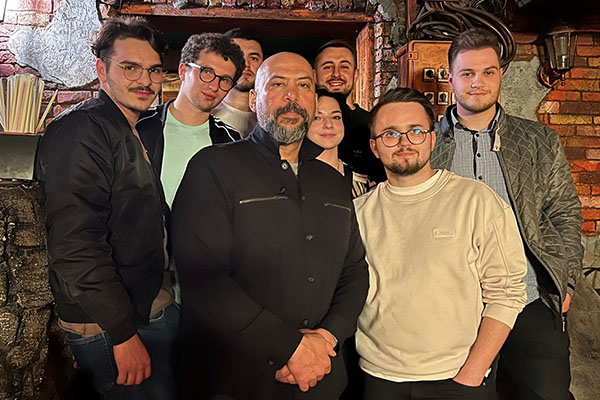
Dr. Sowti gathered with Romanian volunteers, most of them college students, at the border.
After spending a full day at the border, helping wherever he could, Dr. Sowti began the day-long journey back to his family in Austria.
Back home, a month removed from the experience, Dr. Sowti says he continues to feel "blessed".
"I know that most people around here think war is something that only happens in other, more unstable parts of the world," he says. "But because of how I grew up, I always think it's a possibility. And it's because of that that I’m always active.
"I still think of myself as a poor immigrant country boy," he adds. "But I also recognize that I am privileged now with some ability to make a difference. And I think it's reached a point where it feels like the bigger sin is not doing something. I'm blessed to be working for a health system whose leaders empower all of us to try to change the world. I'm so proud of all the good we’re doing locally and abroad."
Others across Penn have supported the crisis in Ukraine in a variety of ways — from students collecting donations to other providers coordinating supply drives.
Additionally, more than $300,000 in monetary donations were collected, including more than $200,000 from the Penn community and $100,000 matched by Penn and Penn Medicine. The Center for Global Health is also seeking physicians and nurses with experience in global health, care of refugee populations, and disaster response, as well as those with ties to Ukraine or with critical language skills for seven-to-14-day deployments to Poland.
Dr. Sowti is currently trying to organize medical kits for the Ukrainian fighters. He's also raising money to supply the volunteer cooks along the Ukrainian border with more food.
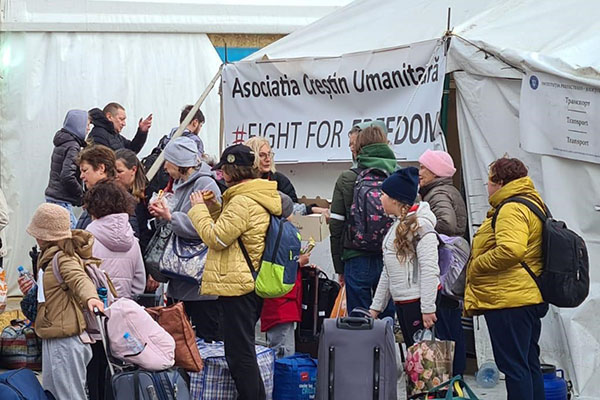
Dr. Sowti worked with colleagues to get medication to organizations providing aid at the border of Ukraine .